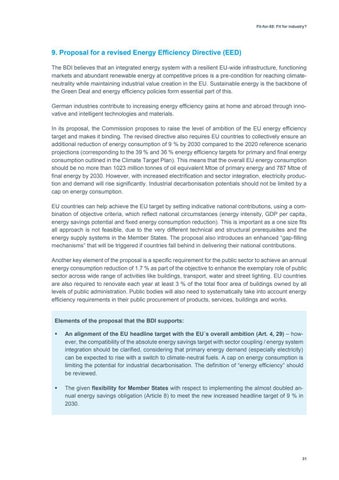Fit-for-55: Fit for industry?
9. Proposal for a revised Energy Efficiency Directive (EED) The BDI believes that an integrated energy system with a resilient EU-wide infrastructure, functioning markets and abundant renewable energy at competitive prices is a pre-condition for reaching climateneutrality while maintaining industrial value creation in the EU. Sustainable energy is the backbone of the Green Deal and energy efficiency policies form essential part of this. German industries contribute to increasing energy efficiency gains at home and abroad through innovative and intelligent technologies and materials. In its proposal, the Commission proposes to raise the level of ambition of the EU energy efficiency target and makes it binding. The revised directive also requires EU countries to collectively ensure an additional reduction of energy consumption of 9 % by 2030 compared to the 2020 reference scenario projections (corresponding to the 39 % and 36 % energy efficiency targets for primary and final energy consumption outlined in the Climate Target Plan). This means that the overall EU energy consumption should be no more than 1023 million tonnes of oil equivalent Mtoe of primary energy and 787 Mtoe of final energy by 2030. However, with increased electrification and sector integration, electricity production and demand will rise significantly. Industrial decarbonisation potentials should not be limited by a cap on energy consumption. EU countries can help achieve the EU target by setting indicative national contributions, using a combination of objective criteria, which reflect national circumstances (energy intensity, GDP per capita, energy savings potential and fixed energy consumption reduction). This is important as a one size fits all approach is not feasible, due to the very different technical and structural prerequisites and the energy supply systems in the Member States. The proposal also introduces an enhanced “gap-filling mechanisms” that will be triggered if countries fall behind in delivering their national contributions. Another key element of the proposal is a specific requirement for the public sector to achieve an annual energy consumption reduction of 1.7 % as part of the objective to enhance the exemplary role of public sector across wide range of activities like buildings, transport, water and street lighting. EU countries are also required to renovate each year at least 3 % of the total floor area of buildings owned by all levels of public administration. Public bodies will also need to systematically take into account energy efficiency requirements in their public procurement of products, services, buildings and works.
Elements of the proposal that the BDI supports: ▪
An alignment of the EU headline target with the EU´s overall ambition (Art. 4, 29) – however, the compatibility of the absolute energy savings target with sector coupling / energy system integration should be clarified, considering that primary energy demand (especially electricity) can be expected to rise with a switch to climate-neutral fuels. A cap on energy consumption is limiting the potential for industrial decarbonisation. The definition of “energy efficiency” should be reviewed.
▪
The given flexibility for Member States with respect to implementing the almost doubled annual energy savings obligation (Article 8) to meet the new increased headline target of 9 % in 2030.
31

